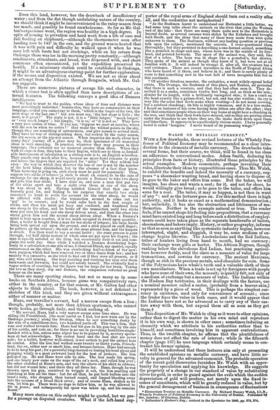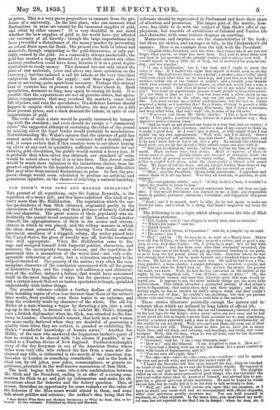WALSH ON METALLIC CURRENCY. * WITH a few drawbacks, these revised
lectures of the Whately Pro- fessor of Political Economy may be recommended as a clear intro- duction to the elements of metallic currency. The drawbacks take several forms, but their source, we think, will be found in too close an adherence to conventional modes. Adam Smith, deducing his principles from facts or history, illustrated those principles by the actual examples. Modern economists, perhaps inventing their miles, illustrate their ideas by supposititious cases. Thus Mr. Walsh, to exhibit the benefits and indeed the necessity of a currency, Blip- poses " a shoemaker wanting bread, and having shoes to dispose of, he goes to the baker and offers him some. But the baker, we will imagine, has shoes and wants a coat ; for it, and not for shoes, he would willingly give bread ; so he goes to the tailor, and offers him some for a coat. The tailor, it may so happen, is not then in want of any " : and so the lecturer goes on. For this method there is high authority, and it looks as exact as a mathematical demonstration ; but, unluckily, it has also the abstraction and lifelessness of ma- thematics. Neither is the example natural or true. The reader feels, if he cannot shape his feeling into propositions, that a currency must have existed long and long before such a distribution of employ- ments could have taken place as the separate handicrafts of tailors, shoemakers, and bakers imply. History, or rather geography, informs us that as soon as anything like systematic industry begins, however interrupted, slight, and sluggish, it may be, some medium of ex- change begins likewise. The Australasian and the Red Indians, tribes of hunters living from hand to mouth, had no currency; their exchange were gifts or barter. The African Negroes, though ranking below the chivalrous Red Indian, but practising agricul- ture however feebly, used the slave as a measure of value for large transactions, and cowries for currency. The ancient Mexicans, though so rich in the precious metals, used chocolate for coin. Some of the Polynesians have whale's teeth and a valuable cloth of their own manufacture. When a trade is set up by foreigners with people who have none of their own, the necessity is quickly felt, not only of a medium of exchange but a measure of value. The Indians within the Hudson Bay territories, in their dealings with the factors, use a nominal measure called a castor, (probably from a beaver-skin,) represented by a piece of wood. This is perhaps the simplest cur- rency in existence, used only for convenience of account ; since the trader fixes the value in both cases, and it would appear that the Indians have not so far advanced as to carry any of their cas- tors away with them, but expend them all as soon as they get them.t
This disposition of Mr. Walsh to cling as it were to other opinions, rather than to digest the matter in his own mind and reproduce it in his own way, is shown in other cases ; sometimes inducing an obscurity which we attribute to his authorities rather than to himself, and sometimes involving him in apparent contradictions. Thus, in the twelfth chapter, he affirms that the plentifulness of money does not affect the rate of interest ; while in the fifteenth chapter (page 137) he uses language which certainly seems to con- tradict his former opinion.
It will be understood that these lectures aim only at presenting the established opinions on metallic currency, and have little no- velty in general for the advanced economist. The probable operation of the recent gold-discoveries furnishes Mr. Walsh with an oppor-
tunity for speculation and applying his knowledge. He suggests the propriety of a change in our standard of value by substituting silver for gold, in order to guard against the evils which the sudden depreciation of gold will produce, not merely upon. the fixed in- comes of annuitants, which will be greatly reduced in value, but by the general derangement of business in consequence of fluctuations
• Elementary Treatise on Metallic Currency. By Richard Hussey Walsh, LL.B., Wbately Professor of Political Economy in the University of Dublin. Published by Orr, London; M•Glashan, Dublin. + Ballantine's Hudson's Bay; noticed in the Spectator for 1948, pp. 373, 374. in prices. This is a very grave proposition to emanate from the pro- fessor of a university. In the first place, who can measure what fluctuations in price are caused by the increased supplies of gold, and what by other causes ? It is very doubtful to our mind whether the new supplies of gold in the world have yet affected our currency at all directly ; though the large importations may have prevented a disturbance of the money-market by preventing an actual drain upon the Bank. The present rise both in labour and materials, though originating in the gold-discoveries, is only par- tially caused by the gold. As a commodity always marketable, the gold has created a larger demand for goods than almost any other natural production could have done, because it is in a great degree equivalent to ready money. This demand has not only raised the price of raw materials, (over and above any mere operation on the currency,) but has induced a call for labour at the very time that emigration has reduced the supply ; and thus wages also have risen or are rising, quite apart from currency. Perhaps this natural heat of exercise has at present a touch of fever about it. Rash speculation, dormant so long, may again be raising its head. It is possible that the exportations are not all genuine orders, but specu- lative consignments, that may overload the markets, cause local fall of prices, and ruin the speculators. If a deficient harvest should happen to conjoin with extensive failures, we may yet see a fall from present prices, and a slack demand for labour, in spite of our importations of gold. The evils of such a state would be greatly increased by tamper- ing with the standard; and even should we escape a " commercial crisis," the suggested attempt at sustaining the value of the pound by making silver the legal tender would probably be mischievous. Notwithstanding Mr. Walsh's opinion that the increase of gold has caused much silver to disappear in countries with a double stand- ard, it seems certain that if this country were to set about buying up silver at any cost in quantities sufficient to substitute for our existing gold circulation, the public would sustain a heavy loss. It is probable that when silver was obtained, our standard of value would be raised above what it is or has been. This forced result would be much more injurious to the industrious classes, from the greatest capitalists to the humblest labourers, than any difficulties that may arise from natural fluctuations in price. In fact, the pro- posed change would seem calculated to produce an artificial and gratuitous injustice, on the chance of relieving a natural hardship.



































 Previous page
Previous page